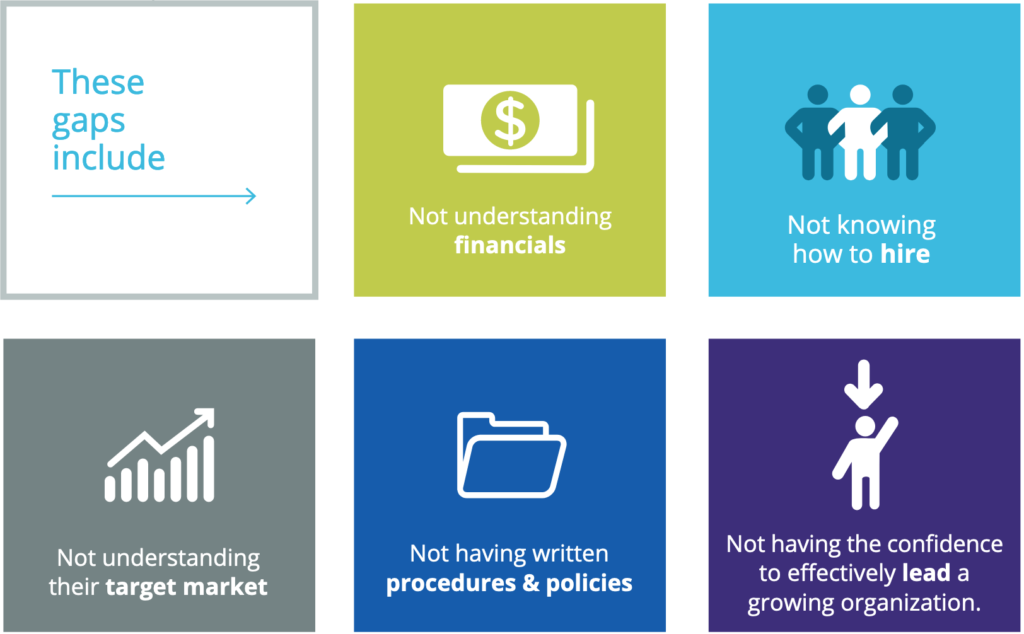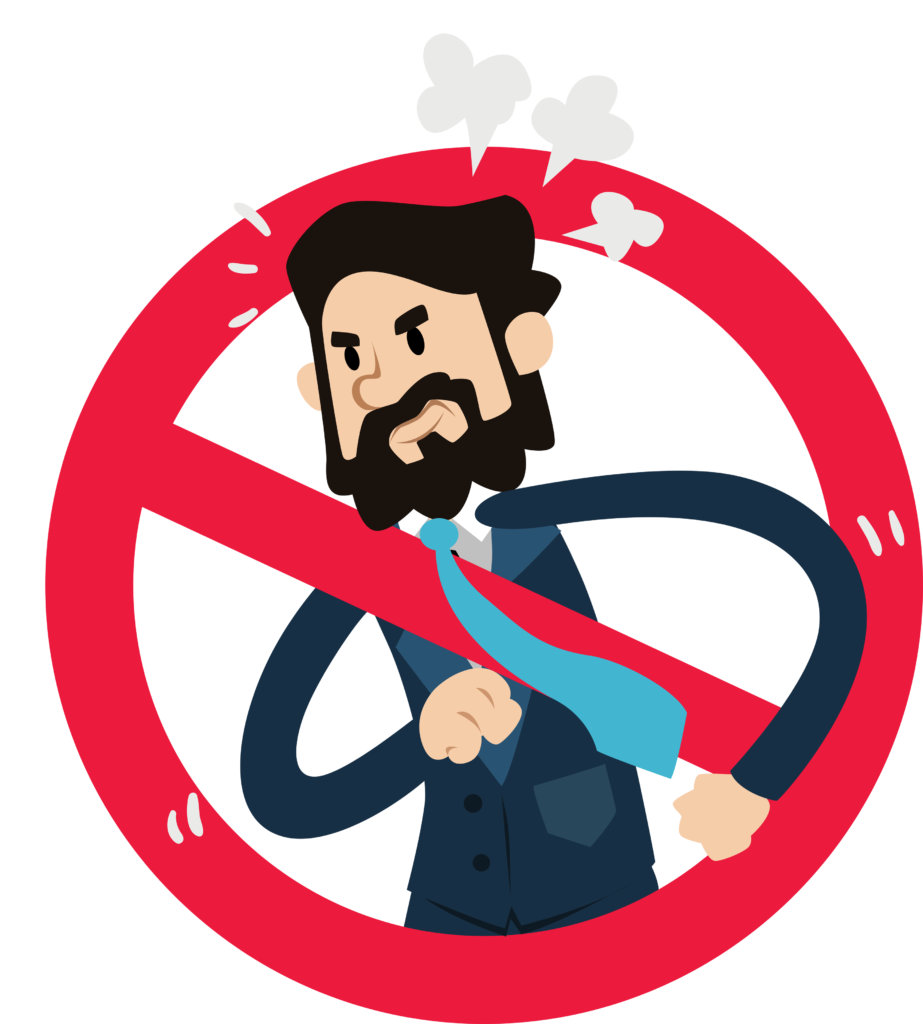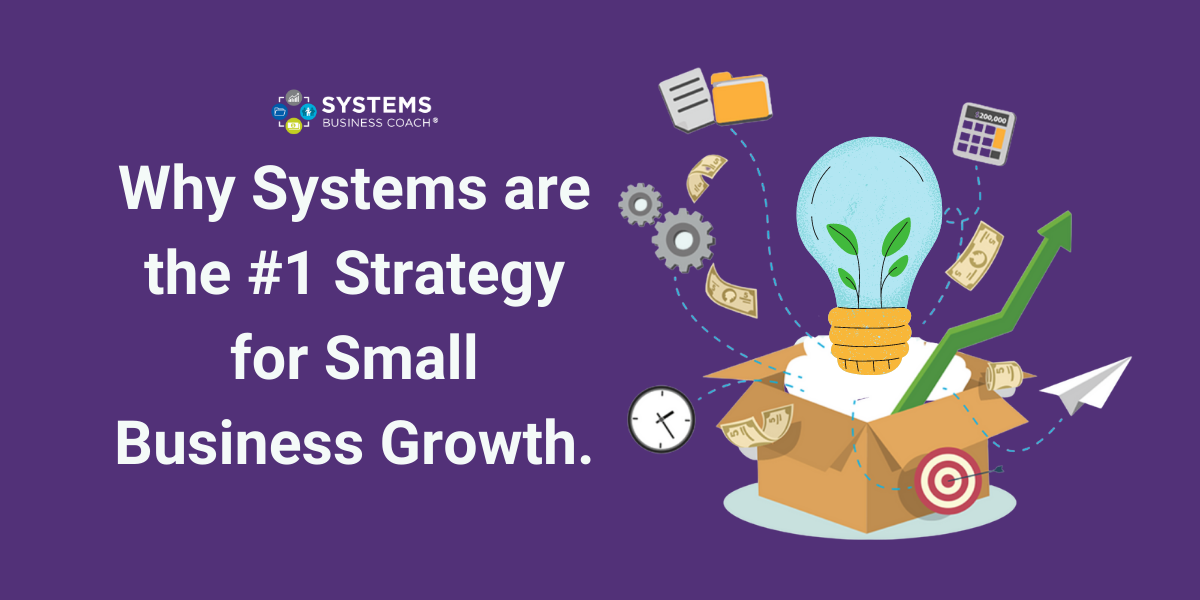Running a small business is hard. There is so much to know to just maintain a business, let alone grow it into a profitable and thriving company.
An entrepreneur may be a skilled technician (ex. a hairdresser) yet when they go to open their own company (ex. hair salon) they face a huge learning curve. This creates a gap that can cause struggling and stagnant businesses.

If you relate to any of the above, don’t worry! It’s a normal part of the entrepreneurial journey to face these challenges. All of these things can come together when you use systems as a strategy for small business growth, stability and profitability.
Where do these gaps come from?
Part of the issue small business owners face when solving these problems alone is that they’re the ones who created those problems in the first place. That’s not to say you are to blame. Just about every business owner falls into the “I have to do everything myself” trap. It’s a natural part of entrepreneurship because no one else shares your passion for what you’re building. You have a vision, and you know how you want to execute it. Yet you rarely have time to refine the structures you’ve built.
Often small business owners are too overwhelmed with doing the technical work of the business to see the systems at play. For example, they miss the basic financial system of accurate data entry, often leaving that to the accountant to deal with once a year, which in turn causes inaccurate books. Without a tight financial reporting system in place, a growing business can go bankrupt in a few months.
The consequences of hiring your best friend to do your bookkeeping, not raising prices fast enough during times of inflation, or the impact of not having key service standards consistently met can all be avoided with systems thinking.
What exactly is a system?
The fact is that everything is a system. Whether that’s the relationship between the husband and wife who own the company, right down to how the coffee is poured. Donella H Meadows defines a system as, “an interconnected set of elements that is coherently organized in a way that achieves something.” (Meadows & Wright, 2008, p.11)
Systems thinking is a constant way of being in a successful organization. When something is not working, an organization can ask, “What is the missing or broken system?” or “What do we need to change to get a better or more desired result?”
Thinking in terms of systems gives you a new language and framework. You can use it to move past the chaos and improve your business one system at a time.

When small business owners stop spending their time looking at problems, doing too much technical work, and blaming people for all the things that are wrong with their business, they can then begin the process of positive change. Seeing the systems in your organization and the dynamics at play is a critical strategy needed for small business growth.
How can you start using systems thinking?
Documentation
You can start the process of systematizing your business by writing down how you do things. Writing down the best way to do everything and continually learning, growing and improving your processes both support your purpose AND provides your team with clear direction and the best chance to be successful. Documentation is a basic and important step.
Attention to feedback
Every system and/or policy that an organization has in place will cause something else to happen. Systems thinking and documentation then need to include the ability to step back and look at the whole system. Before charging ahead with a new system, an organization can consider how that policy or procedure is going to impact another part of the business. Attention to feedback is an essential component of systems thinking and using this strategy for small business growth.
How do systems help?
Systems make expectations and processes clear. When everyone on the team knows what they are doing and why they are doing it, they start performing better and there’s less tension between the team. Systems also create clear communication with vendors, suppliers or contractors.
As a result, everyone has a better relationship with the organization. A systematized business gives clients a reliable experience every time they interact with the company. The staff likes working there because systems give them authority and responsibility in their roles, which naturally results in them creating better ways of doing things and improving the systems.
Since employees feel valued and understand the company’s purpose through a systems lens, they stay longer which increases retention rates and lessens the stress for owners who no longer have to hire staff every few months.

Many small business owners feel trapped by their company. Systems make it so you can leverage what you know and structure your business so it’s not reliant on you anymore. It’s a path to personal freedom.
Systems also protect organizations from fraud and theft. Businesses can create a system for reconciling bank accounts, a system for tracking time, a system for checking references, a system for protecting corporate documents, and a system for tracking outstanding cheques, purchase orders and contracts. This stops employees from spending company money without any controls.
The ultimate strategy for small business growth
Overall, systems reduce risk and encourage profitability. When there are systems in an organization people can make informed, advantageous decisions because they know exactly what’s going on. Systems create order and order creates profitability. This is why systems are such a powerful strategy for small business growth.
When you understand systems thinking, you can objectively look at your business, and yourself, to see what is causing the missing or broken system.
You’ve got this!
Until next time, enjoy your Entrepreneurial Journey!












